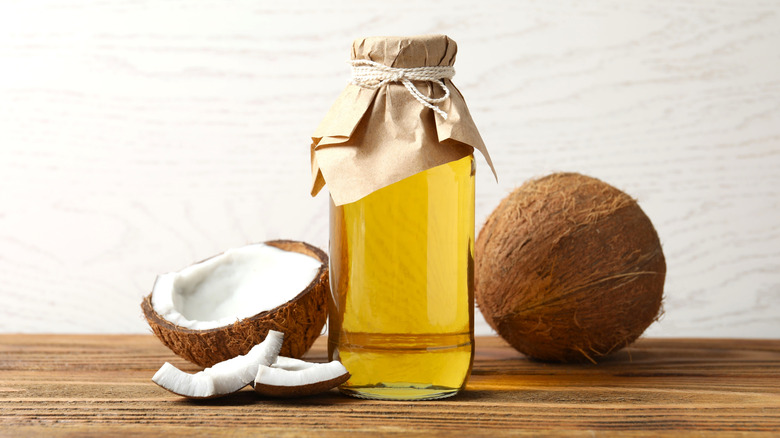The Healthiest Oils To Use When Cooking Eggs (And Why It Matters)
An egg for breakfast provides you with some protein to fill you up for the morning. Cooking eggs in the microwave gives them a runny taste, and hard-boiled eggs can stink up your kitchen. A good scrambled egg tastes great with a little bit of crisp from the right kind of oil. While cooking sprays save you on calories, cooking oil provides a better texture for your eggs.
Let's face it. Many oils aren't necessarily healthy because they're often refined or high in saturated fat. When sautéing eggs, you can use olive oil or avocado oil because they're both low in saturated fat and have heart-healthy omega-3 fatty acids (here's how to tell if your extra-virgin olive oil is real or fake).
However, you'll have to keep an eye on your stove while cooking your eggs, especially if you use extra-virgin olive oil. Olive oil has a lower smoke point than avocado oil and highly refined oils such as canola, vegetable, and corn oils. Even though olive oil is high in antioxidants, cooking oils at high temperatures release carcinogens into the air and produce free radicals in your food.
Highly refined oils lose antioxidants and might have trans fats
A high heat setting on one of your stove's burners can help you achieve that irresistible crisp on your eggs and other foods, but it's crucial to choose the right oil to handle the heat. Highly refined oils are often the go-to for their higher smoke points, making them less likely to break down under intense temperatures. At first glance, some refined oils, like soybean or canola oil, might seem like healthy options because they're lower in saturated fat. However, don't be fooled: These oils often contain trans fats, which can sneakily raise your LDL ("bad") cholesterol and lower your HDL ("good") cholesterol, tipping the scale in the wrong direction. (Read more about which cooking oils to use and avoid.)
Refined oils also lose some of their nutritional charm during processing. Heat, pressure, and chemicals used in refining strip away natural antioxidants and nutrients. But not all refined oils are created equal. Those labeled "cold-pressed," like refined olive or avocado oil, retain more of their goodness and boast higher smoke points than their unrefined versions. Refined avocado oil has one of the highest smoke points, making it a good choice to cook eggs to perfection at higher temperatures.
Is coconut oil good for cooking eggs?
Coconut oil also tends to be more stable at higher cooking temperatures because it's high in saturated fat. Refined coconut oil has a higher smoke point than unrefined coconut oil. People following ketogenic or Paleo diets might claim that coconut oil is healthier for cooking foods like eggs. Coconut oil might provide a unique taste to your eggs, but it's not as healthy as you think.
You might be familiar with some health claims about coconut oil, but they rely on a specific type of coconut oil made with medium-chain triglycerides (MCTs). According to the Harvard School of Public Health, MCTs are quickly metabolized into energy while also helping you feel full. However, most of the coconut oil you see on store shelves contains mostly lauric acid rather than MCTs.
In a 2020 review in Circulation that combined 16 studies, coconut oil was found to raise LDL cholesterol levels by more than 10 points and HDL cholesterol by 4 points. While increasing your HDL cholesterol can be good for your heart, the researchers concluded that coconut oil shouldn't be considered healthy in reducing your risk of cardiovascular disease.



